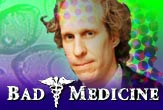When a Rolling Stone Bounces

The indestructible Keith Richards is back on his feet after falling from a tree two weeks ago in Fiji, banging his head, and suffering a concussion. He was laid up for over a week in a New Zealand hospital, ultimately requiring surgery to relieve pressure on his brain from fluid build-up.
I'm not entirely sure he's recovered. He said he looks forward to getting back to playing the flugelhorn for the Beach Boys.
Nevertheless, the veteran Rolling Stones guitarist's plight highlights the fact that concussions are nasty business. You wouldn't have guessed this, though, from the popular media. From blockbuster action movies to the sappiest of comedies, actors are consistently getting knocked out, often with a chair or bottle over the head. Then they wake up with hardly a hangover. It's as if they are just being nursed to sleep.
The reality
But a concussion is a bruise to the brain, and it doesn't heal so quickly. A mild concussion is a blow that causes confusion and short-term memory loss; the so-called classic concussion entails a loss of consciousness, and the aftereffects are far worse.
The details are sketchy about Keith Richards' accident. No doubt doctors fretted over which painkiller wouldn't adversely react with the various narcotics he was on when he decided climbing a tree at age 62 was a good idea. He likely suffered from a mild concussion. Fortunately (I Can't Get No) "Satisfaction" only has two chords to keep track of.
One concussion isn't so bad. Each successive knock to the head, however, multiplies your risk of suffering permanent memory loss, brain damage or even a loss in vision, hearing, smell or dexterity. A history of concussions may result in slurred speech, learning disabilities, balance problems and emotional instability.
Get the world’s most fascinating discoveries delivered straight to your inbox.
The chance of receiving a second concussion is four times greater than receiving the first. Even the mildest of concussions may cause flu-like symptoms of dizziness and fatigue for a week. More serious concussions may lead to irritability and restless sleep for up to six months.
Various studies in the pages of Neurology, the Clinical Journal of Sport Medicine and the Journal of the American Medical Association show that most career boxers have noticeable symptoms of brain damage: slurred speech, slow movements, confusion, random blackouts, emotional instability, severe mood swings and confrontations with the law, to name but a few.
School lessons
High schools are finally taking concussions seriously after tragic reports of kids dying on the football field when they enter back into the game too early after a blow to the head. The Centers for Disease Control and Prevention estimate that there are 200,000 concussions per year in high school sports. State by state, there are guidelines that characterize concussions into grades, the first grade being the least severe (with no amnesia or loss of consciousness) and the highest grade the most severe (loss of consciousness).
A grade-one concussion will force a player out of the game for at least twenty minutes, pending further evaluation. A grade-two concussion keeps a player out of the game and practice for at least a week; a higher-grade concussion benches the player for at least a month and often the year. Get knocked out twice, and you won't be allowed to play again.
Getting knocked out completely, a classic concussion, will inevitably lead to hours of confusion, nausea and vomiting. Such a head injury is a major cause of smell and taste disorders. Just imagine James Bond faced with this kind of reality. "My name is Bond, something Bond. I think. You'll have to forgive me. I've been rendered unconscious so many times that I suffer from long-term memory loss."
That's certainly not the coolest of Bond lines, which is likely why you'll never hear concussions described accurately in a Hollywood movie.
Christopher Wanjek is the author of the books “Bad Medicine” and “Food At Work.” Got a question about Bad Medicine? Email Wanjek. If it’s really bad, he just might answer it in a future column. Bad Medicine appears each Tuesday on LIveScience.
Related Stories
- Concussion Detector
- Comatose Patients Falsely Depicted in Movies
- Emergency Room Visits Soar
More Bad Medicine
- Treating the Symptoms: What's Wrong with U.S. Health Care
- Vitamin Mania: The Truth about Antioxidants
- Zacarias Moussaoui: Wicked But Not Schizophrenic
- Suffocating Trends: Oxygen Bars and Drinks
- Few Clues to High IQs
- Licensed to Kill: Some Doctors are Real Naturals
- War on Bacteria is Wrongheaded
- Soda Sales Go Flat, Industry Fights Back
- Go Ahead, Drink Bacon Grease for Breakfast

Christopher Wanjek is a Live Science contributor and a health and science writer. He is the author of three science books: Spacefarers (2020), Food at Work (2005) and Bad Medicine (2003). His "Food at Work" book and project, concerning workers' health, safety and productivity, was commissioned by the U.N.'s International Labor Organization. For Live Science, Christopher covers public health, nutrition and biology, and he has written extensively for The Washington Post and Sky & Telescope among others, as well as for the NASA Goddard Space Flight Center, where he was a senior writer. Christopher holds a Master of Health degree from Harvard School of Public Health and a degree in journalism from Temple University.
